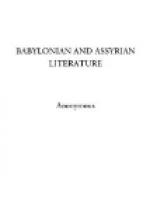The two following hymns, both of which are unfortunately mutilated, are interesting from their subject-matter. The first is addressed to the sun-god Tammuz, the husband of Istar, slain by the boar’s tusk of winter, and sought by the goddess in the underground world. It is this visit which is described in the mythological poem known as the “Descent of Istar into Hades” ("Records of the Past,” Vol. I, p. 143). The myth of Tammuz and Istar passed, through the Phoenicians, to the Greeks, among whom Adonis and Aphrodite represent the personages of the ancient Accadian legend. Tammuz is referred to in Ezek. viii. 14. (See “Records of the Past,” Vol. IX, p. 147.) The second hymn treats of the world-mountain, the Atlas of the Greeks, which supports the heaven with its stars, and is rooted in Hades. Under its other name, “Kharsak-kurra,” or “Mountain of the East,” it was identified with the present Mount Elwend, and was regarded as the spot where the ark had rested, and where the gods had their seat. A reference is made to it in Isa. xiv. 13. Both hymns illustrate the imagery and metaphor out of which grew the mythology of primeval Babylonia, and offer curious parallels to the Aryan hymns of the Rig-Veda. The cuneiform texts are lithographed in the “Cuneiform Inscriptions of Western Asia,” Vol. IV, 27, I, 2.
TWO ACCADIAN HYMNS
I
1 O shepherd,[1] Lord Tammuz, Bridegroom[2] of Istar!
2 Lord of Hades, Lord of Tul-Sukhba! 3 Understanding
one, who among the papyri the water drinks
not!
4 His brood in the desert, even the reed, he created
not.[3] 5 Its bulrush in his canal he lifted not
up. 6 The roots of the bulrush were carried away.
7 O god of the world, who among the papyri the water
drinks
not!
.....[4]
[Footnote 1: The early Accadian kings frequently call themselves “shepherds.” According to Berosus, Alorus, the first antediluvian king of Babylonia, gave himself the same title. Compare the Homeric [Greek: poimaen laon].]
[Footnote 2: “Khamir,” literally “red” or “blushing one,” in reference to the glow of the setting sun.]
[Footnote 3: Or, “was not green.”]
[Footnote 4: Lacuna.]
II
1 O mighty mountain of Bel, Im-kharsak,[1] whose
head rivals
heaven, whose root (is) the
holy deep!
2 Among the mountains, like a strong wild bull,
it lieth down.
3 Its horn like the brilliance of the sun is bright.
4 Like the star of heaven[2] it is a prophet and
is filled with
sheen.
5 O mighty mother of Beltis, daughter of Bit-Esir:
splendor
of Bit-kurra,[3] appointment
of Bit-Gigune, handmaid of
Bit-Cigusurra![4]
.....[5]
[Footnote 1: “Wind of the mountain.”]
[Footnote 2: That is, Dilbat, “the prophet,” or Venus, the morning-star.]




